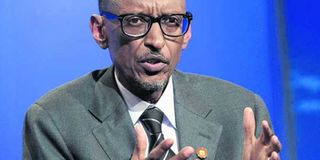Rwanda votes yes to allow extra terms for Paul Kagame

Rwandan President Paul Kagame. The amended Constitution allowing him to potentially rule until 2034 has come into force, the justice minister said on December 25, 2015. AFP PHOTO | SAUL LOEB
What you need to know:
- The amendment allows Kagame to run for a third seven-year term in 2017, at the end of which the new rules take effect and he will be eligible to run for a further two five-year terms.
- Kagame has run Rwanda since his ethnic Tutsi rebel army, the Rwandan Patriotic Front (RPF), ended a 1994 genocide by extremists from the Hutu majority.
- On Friday, the EU delegation in Kigali said there had been a lack of "sufficient time and space for debate" on the issue.
- The country's tiny opposition Green Party also protested it was impossible to organise a counter campaign at such short notice.
KIGALI
Rwanda has voted to change the constitution to allow President Paul Kagame to potentially rule until 2034, according to partial referendum results, election officials said on Saturday.
"We have seen the will of the people. It's clear that what the people want, they can achieve," said National Electoral Commission chief Kalisa Mbanda, unveiling preliminary results from some 70 per cent of the country and announcing a 'yes' vote of 98.1 per cent.
"They called for the change of the constitution and they have made it," he said, according to the pro-government New Times newspaper.
Kagame, 58, could now be in power potentially for another 17 years.
"What is happening is the people's choice,” Kagame told reporters after casting his vote on Friday.
The amendment allows Kagame to run for a third seven-year term in 2017, at the end of which the new rules take effect and he will be eligible to run for a further two five-year terms.
DENOUNCED AMENDMENTS
The proposed amendments have been denounced by Washington and Brussels as undermining democracy in the central African country.
"Yes, Rwandans have spoken out loud and clear; they have taken their own destiny and that of their country into their own hands," a New Times editorial said on Saturday.
"There was no doubt from the beginning that the results from the referendum to amend the constitution was what was expected, regardless of the lame attempts to pour water on the process by Rwanda's closest 'development partners',” it said in an allusion to US and European criticism.
Kagame has run Rwanda since his ethnic Tutsi rebel army, the Rwandan Patriotic Front (RPF), ended a 1994 genocide by extremists from the Hutu majority, when an estimated 800,000 people were massacred, the vast majority of them being Tutsis.
CHANGES RUSHED THROUGH
The issue of long-serving rulers clinging to power has caused turmoil in Africa, where some leaders have been at the helm for decades.
The amendments brought criticism from the United States and the European Union as well as the country's tiny opposition Green Party.
On Friday, the EU delegation in Kigali said there had been a lack of "sufficient time and space for debate" on the issue, with the date for the referendum only announced on December 8, 2015 and the draft of the changes "only published publicly less than one day ahead of the vote."
The country's tiny opposition Green Party also protested it was impossible to organise a counter campaign at such short notice.
"The opposition would have won. The Democratic Green Party of Rwanda will not give up on the struggle to make Rwanda a vibrant democracy," Green party president Frank Habineza said in a statement on Saturday.





